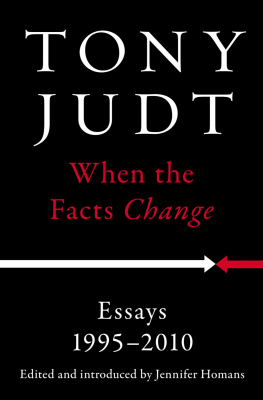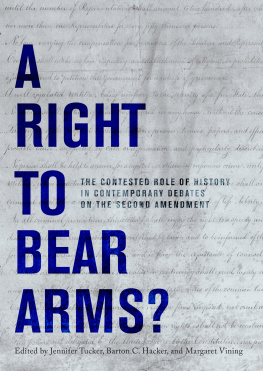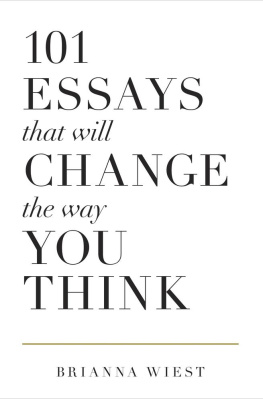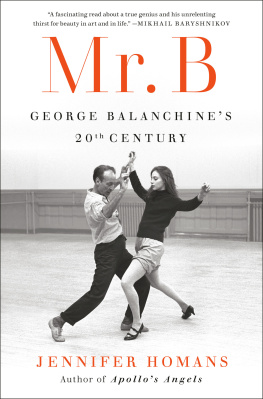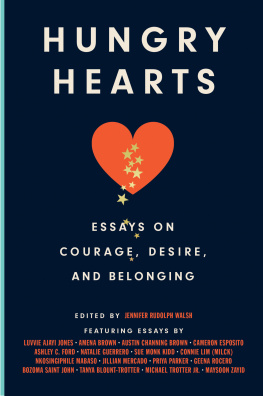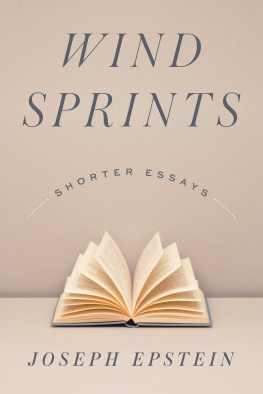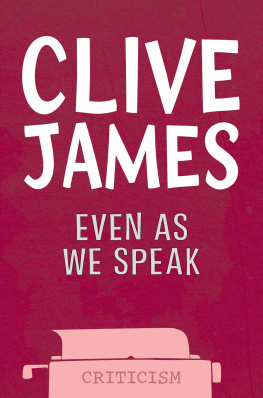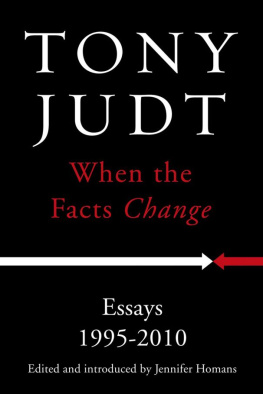Homans Jennifer - When the facts change: essays, 1993-2010
Here you can read online Homans Jennifer - When the facts change: essays, 1993-2010 full text of the book (entire story) in english for free. Download pdf and epub, get meaning, cover and reviews about this ebook. City: New York, year: 2014;2015, publisher: Penguin Group US, genre: Politics. Description of the work, (preface) as well as reviews are available. Best literature library LitArk.com created for fans of good reading and offers a wide selection of genres:
Romance novel
Science fiction
Adventure
Detective
Science
History
Home and family
Prose
Art
Politics
Computer
Non-fiction
Religion
Business
Children
Humor
Choose a favorite category and find really read worthwhile books. Enjoy immersion in the world of imagination, feel the emotions of the characters or learn something new for yourself, make an fascinating discovery.
- Book:When the facts change: essays, 1993-2010
- Author:
- Publisher:Penguin Group US
- Genre:
- Year:2014;2015
- City:New York
- Rating:5 / 5
- Favourites:Add to favourites
- Your mark:
- 100
- 1
- 2
- 3
- 4
- 5
When the facts change: essays, 1993-2010: summary, description and annotation
We offer to read an annotation, description, summary or preface (depends on what the author of the book "When the facts change: essays, 1993-2010" wrote himself). If you haven't found the necessary information about the book — write in the comments, we will try to find it.
When the facts change: essays, 1993-2010 — read online for free the complete book (whole text) full work
Below is the text of the book, divided by pages. System saving the place of the last page read, allows you to conveniently read the book "When the facts change: essays, 1993-2010" online for free, without having to search again every time where you left off. Put a bookmark, and you can go to the page where you finished reading at any time.
Font size:
Interval:
Bookmark:

A LSO BY T ONY J UDT
Thinking the Twentieth Century (with Timothy Snyder)
The Memory Chalet
Ill Fares the Land
Reappraisals: Reflections on the Forgotten Twentieth Century
Postwar: A History of Europe Since 1945
The Politics of Retribution in Europe (edited with Jan Gross and Istvn Dek)
The Burden of Responsibility: Blum, Camus, Aron, and the French Twentieth Century
Language, Nation, and State: Identity Politics in a Multilingual Age
(edited with Denis Lacorne)
A Grand Illusion?: An Essay on Europe
Past Imperfect: French Intellectuals, 19441956
Marxism and the French Left: Studies on Labour and Politics in France 19301982
Resistance and Revolution in Mediterranean Europe 19391948 (editor)
Socialism in Provence 18711914: A Study in the Origins of the Modern French Left
La reconstruction du Parti Socialiste 19211926
A LSO BY J ENNIFER H OMANS
Apollos Angels: A History of Ballet

PENGUIN PRESS
Published by the Penguin Group
Penguin Group (USA) LLC
375 Hudson Street
New York, New York 10014

USA Canada UK Ireland Australia New Zealand India South Africa China
penguin.com
A Penguin Random House Company
First published by Penguin Press, a member of Penguin Group (USA) LLC, 2015
Copyright 2015 by Jennifer Homans
Penguin supports copyright. Copyright fuels creativity, encourages diverse voices, promotes free speech, and creates a vibrant culture. Thank you for buying an authorized edition of this book and for complying with copyright laws by not reproducing, scanning, or distributing any part of it in any form without permission. You are supporting writers and allowing Penguin to continue to publish books for every reader.
What Is to Be Done? is published for first time in this volume.
Israel Must Unpick Its Ethnic Myth first appeared in Financial Times.
Crimes & Misdemeanors and Freedom and Freedonia first appeared in The New Republic.
A Lobby, Not a Conspiracy, Fictions on the Ground, Israel Without Clichs, and Generations in the Balance first appeared in The New York Times.
The other selections first appeared in The New York Review of Books.
ISBN 978-0-698-15337-0
Version_1
For Joe
When the facts change, I change my mind. What do you do, sir?
QUOTATION COMMONLY ATTRIBUTED TO J OHN M AYNARD K EYNES
Other men will make history.... All I can say is that on this earth there are pestilences and there are victimsand as far as possible one must refuse to be on the side of the pestilence.
A LBERT C AMUS, The Plague
by Jennifer Homans
The only way for me to write this introduction is to separate the man from the ideas. Otherwise, I get pulled back into the man, who I loved and was married to from 1993 until his death in 2010, rather than forward into the ideas. As you read these essays, I hope that you, too, will focus on the ideas, because they are good ideas, and they were written in good faith. In good faith may have been Tonys favorite phrase and highest standard, and he held himself to it in everything he wrote. What he meant by it, I think, was writing that is free of calculation and maneuver, intellectual or otherwise. A clean, clear, honest account.
This is a book about our age. The arc is down: from the heights of hope and possibility, with the revolutions of 1989, into the confusion, devastation, and loss of 9/11, the Iraq war, the deepening crisis in the Middle East, andas Tony saw itthe self-defeating decline of the American republic. As the facts changed and events unfolded, Tony found himself turned increasingly and unhappily against the current, fighting with all of his intellectual might to turn the ship of ideas, however slightly, in a different direction. The story ends abruptly, with his untimely death.
This book is also, for me, a very personal book, since our age was also my age with Tony: the early essays date to the first years of our marriage and the birth of our son Daniel, and follow through our time together in Vienna, Paris, New York, the birth of Nicholas, and the growing up of our family. Our life together began, not coincidentally, with the fall of Communism in 1989: I was a graduate student at New York University, where Tony taught. In the summer of 1991, I traveled across Central Europe, and when I got back I wanted to know more. I was advised to take an independent study with Tony Judt.
I did, and our romance began, over books and conversations about European politics, war, revolution, justice, art. It wasnt the usual dating arrangement: our second course meeting took place in a restaurant over dinner. Tony pushed the books aside, ordered wine, and told me of his time in Prague under Communism, and then in 1989, walking through silent snow-covered squares and streets deep into the night soon after the Velvet Revolution, clearly in awe at the turn of historical fateand the feelings that were already apparent between us. We watched movies, went to art exhibitions, ate Chinese food, he even cooked (badly). Finallythe key to our courtshiphe invited me on a trip to Europe: Paris, Vienna, Budapest, a hair-raising drive over the Simplon Pass in a storm (I drovehe had migraines). We took trains, and I watched him pouring over timetables, clocking departures and arrivals like a kid in a candy store: Zermatt, Brig, Florence, Venice.
It was a great romance, and it was a European romance, part of a larger romance with Europe that defined Tonys life, and his lifes work. At times, I think he even thought of himself as European. But he wasnt really. Sure, he spoke French, German, Italian, Hebrew, Czech, some Spanish, but he was never at home in any of these places. He was more Central European, but not exactly that eitherhe didnt quite have that history, except by professional engagement and family roots (Russian, Polish, Romanian, and Lithuanian Jews). He was very English, too, by habit and upbringing (he could move effortlessly between his childhood cockney and confident Oxbridge prose), but he wasnt really that eithertoo Jewish, too Central European. Its not that he was alienated from any of these places, although in some cases he was; it was more that he was attached to bits of all of them, which is why he couldnt let go of any of them.
So perhaps it is not surprising that although we settled in New York from the start, we spent much of our life together planning to liveor livingsomewhere else. We were expert packers and often joked that we would write a book together called something like At Home in Europe: Everything You Need to Know about Schools and Real Estate. By far the best gift I ever gave to Tony was a subscription to Thomas Cooks Railway Timetable.
It was only after 2001 that he really settled. This was partly because of his health: that year he was diagnosed with a serious cancer and underwent major surgery, radiation, and other draining therapies. Partly, too, because of the WTC attack. It became increasingly difficult to travel, and the horror of the event itself, combined with his illness, had a homing effect; he wanted to be here with me and the boys. Whatever the reasons, in the years that followed he slowly became more and more, though never quite, Americanironically at the very moment when he found greatest reasons to be critical of its politics. He acquired citizenship: Quiz me, he would say to the kids in the weeks before the test, and they would gleefully take him through the paces, no matter that he had taught American politics for years at Oxford. Around 2003 I noticed a shift in his thinking, and in his writing, from them to us: The Way
Font size:
Interval:
Bookmark:
Similar books «When the facts change: essays, 1993-2010»
Look at similar books to When the facts change: essays, 1993-2010. We have selected literature similar in name and meaning in the hope of providing readers with more options to find new, interesting, not yet read works.
Discussion, reviews of the book When the facts change: essays, 1993-2010 and just readers' own opinions. Leave your comments, write what you think about the work, its meaning or the main characters. Specify what exactly you liked and what you didn't like, and why you think so.

